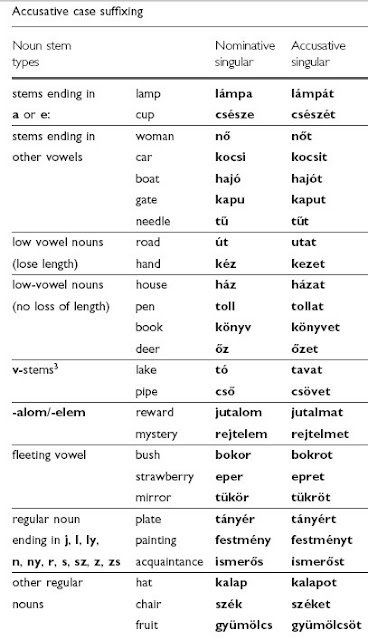Here is a site that helps you type Chinese even if you do not have the fonts.
http://www.chinese.typepad.com/
Who's here
Thursday, March 24, 2011
I am, you are, he is ...
szép <--> csúnya, ronda beautiful <--> ugly
magas <--> alacsony tall <--> short
jó <--> rossz good <--> bad
nagy <--> kicsi big <--> small
új <--> régi new <--> old
tiszta <--> piszkos clean <--> clean
olcsó <--> drága cheap <--> expensive
világos <--> sötét light <--> dark
Én vagyok. - I am Mi vagyunk. - We are.
Te vagy. - You are Ti vagytok. - You are.
Ő (van). - He/She/It is Ők (vannak). - They are.
Ön - You, formal
Önök - You, plural, formal
Én magas vagyok. -- I am tall.
Te magas vagy. -- You are tall.
Ő magas. -- He/She is tall.
Te magas vagy. -- You are tall.
Ő magas. -- He/She is tall.
Szép vagy. -- You are beautiful.
Ő beteg.-- He/She is sick.
A fiú alacsony.-- The boy is short.
A lány kedves. -- The girl is nice.
A szoba világos. -- The room is light.
Ön fiatal.-- You are young.
A szálloda olcsó? -- Is the hotel cheap?
A tej drága? -- Is milk expensive?
Rossz vagyok? -- Am I bad?
Ő csúnya? -- Is he ugly?
The Accusative case
In the following English sentences the underlined words are the direct objects that are in an Accusative case in Hungarian:
I like tea.
We are watching television.
I bought a shirt and a skirt yesterday.
I hate misunderstandings.
The sign for accusative case is -t.
Let us see some examples:
tea - teát (tea)
apa - apát (father)
telefon - telefont (telephone)
televízió - televíziót (television)
ablak - ablakot (window)
terem - termet (room)
apa - apát
teve - tevét (camel)
mese - mesét (story)
kefe - kefét (brush)
táska - táskát (bag)
idő - időt (time, weather)
hajó - hajót (ship)
zokni - zoknit (socks)
kör - kört (circle)
szekrény - szekrényt (cupboard)
villamos - villamost (tram)
busz - buszt (bus)
kenyér - kenyeret (bread)
kabát - kabátot (coat)
kalap - kalapot (hat)
toll - tollat (pen)
füzet - füzetet (notebook)
szemöldök - szemöldököt (eyebrow)
terem - termet (room, moving vowels that can be only "o" or "e")
eper - epret (strawberry)
iker - ikrek (twins)
kéz - kezet (hand, shortening of the vowel)
tér - teret (space, square)
Az apa újság. . . olvas. --> Az apa újságot olvas.
A tanár egy diák. . . keres.
Vera gyümölcs. . . vásárol.
A fiúk film. . . néznek.
Egy lány levél. . . ír.
A gyerek táska. . . visz.
A postás egy csomag. . . hoz.
A szobában rádió. . . hallgattok.
I like tea.
We are watching television.
I bought a shirt and a skirt yesterday.
I hate misunderstandings.
The sign for accusative case is -t.
Let us see some examples:
tea - teát (tea)
apa - apát (father)
telefon - telefont (telephone)
televízió - televíziót (television)
ablak - ablakot (window)
terem - termet (room)
Let us see the rules:
1. if the word ends with an "a" or "e", you want to lenghten the last vowel: a --> á , e --> é
tea - teátapa - apát
teve - tevét (camel)
mese - mesét (story)
kefe - kefét (brush)
táska - táskát (bag)
2. if the word ends with any other consonant then simply add -t:
cipő - cipőt (shoes)idő - időt (time, weather)
hajó - hajót (ship)
zokni - zoknit (socks)
3. if the word ends with a single r, l, j, ly, m, n, ny, s, sz, z or zs, simply add -t:
sör - sört (beer)kör - kört (circle)
szekrény - szekrényt (cupboard)
villamos - villamost (tram)
busz - buszt (bus)
4. if the word ends with other consonants or a double consonant then add a linking vowel before -t. If the word contains back vowels, add -o- or -a- (mostly -o-). If it contains front vowels, add -e-:
számítógép - számítógépet (computer)kenyér - kenyeret (bread)
kabát - kabátot (coat)
kalap - kalapot (hat)
toll - tollat (pen)
füzet - füzetet (notebook)
If the word contains front rounded vowels, add an -ö- before the -t ending:
gyümölcs - gyümölcsöt (fruit)szemöldök - szemöldököt (eyebrow)
Some exceptions:
tej - tejet (milk, adding linking vowel after "j")terem - termet (room, moving vowels that can be only "o" or "e")
eper - epret (strawberry)
iker - ikrek (twins)
kéz - kezet (hand, shortening of the vowel)
tér - teret (space, square)
Az apa újság. . . olvas. --> Az apa újságot olvas.
A tanár egy diák. . . keres.
Vera gyümölcs. . . vásárol.
A fiúk film. . . néznek.
Egy lány levél. . . ír.
A gyerek táska. . . visz.
A postás egy csomag. . . hoz.
A szobában rádió. . . hallgattok.
Thursday, March 17, 2011
Saturday, March 5, 2011
Subscribe to:
Posts (Atom)



